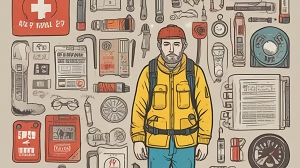Emergencies don’t send invitations—they strike when least expected. From natural disasters to accidents, being prepared can mean the difference between chaos and calm. Whether you're living in a city or a rural area, these survival basics are something everyone should know. Let’s dive into the top 10 emergency preparedness tips that could help save your life or someone else’s.
1. 🧯 Know Basic First Aid
Every person should know how to treat wounds, stop bleeding, perform CPR, and respond to choking. A simple first-aid course can equip you with these life-saving skills.
2. 💧 Store Clean Drinking Water
Water is essential for survival. Store at least 3 days' worth of clean water (about 4 liters per person per day). Keep it in a cool, dry place and change it every 6 months.
3. 🧳 Prepare a Go-Bag
A go-bag or emergency kit should include:
- Flashlight
- Batteries
- First-aid kit
- Water bottles
- Non-perishable food
- Extra clothes
- Copies of important documents
4. 📱 Stay Informed with Alerts
Sign up for government emergency alerts via SMS or apps. Radio and battery-powered devices can be helpful if the internet fails.
5. 🔥 Learn How to Use a Fire Extinguisher
Every home should have at least one fire extinguisher. Make sure you know how to use it (remember PASS: Pull, Aim, Squeeze, Sweep).
6. 🗺️ Know Your Local Evacuation Routes
Be familiar with evacuation plans in your area, especially if you live in flood, earthquake, or fire-prone zones. Practice the route with your family.
7. 🔋 Keep Power Banks or Solar Chargers
Phones are critical in emergencies. Always keep your power banks charged or use solar-powered chargers as a backup.
8. 🍱 Store Non-Perishable Foods
Canned goods, protein bars, dry fruits, and ready-to-eat meals are essential. Store enough to last at least 3 days to a week.
9. 🧠 Practice Emergency Drills
Don’t wait for a disaster to react. Practice fire drills, earthquake drills, and evacuation plans with your family or workplace.
10. 🐾 Plan for Pets & Elderly
Make arrangements for elderly family members, children, and pets. Pack their medications, food, and ID tags in your emergency kit.
✅ Final Thoughts
Emergency preparedness isn’t just for survival experts—it’s for everyone. A few basic steps can prevent panic and ensure you respond calmly during a crisis. Remember: Preparedness is protection.
Start today—because being prepared is always better than being sorry.
Our Latest Posts
- Futuristic Tech You’ll Use Daily by 2025 (and After)
- Metaverse, Web 4.0, and AI Will Redefine 2025 and Beyond
- Trends For Entrepreneur Should Prepare For
- Next Gen Tech : What Will Technology Look Like in 2030?
- Tech Forecast: Game-Changing Trends and Predictions
- Tech for Tomorrow: Sustainability and Innovation Beyond 2025







